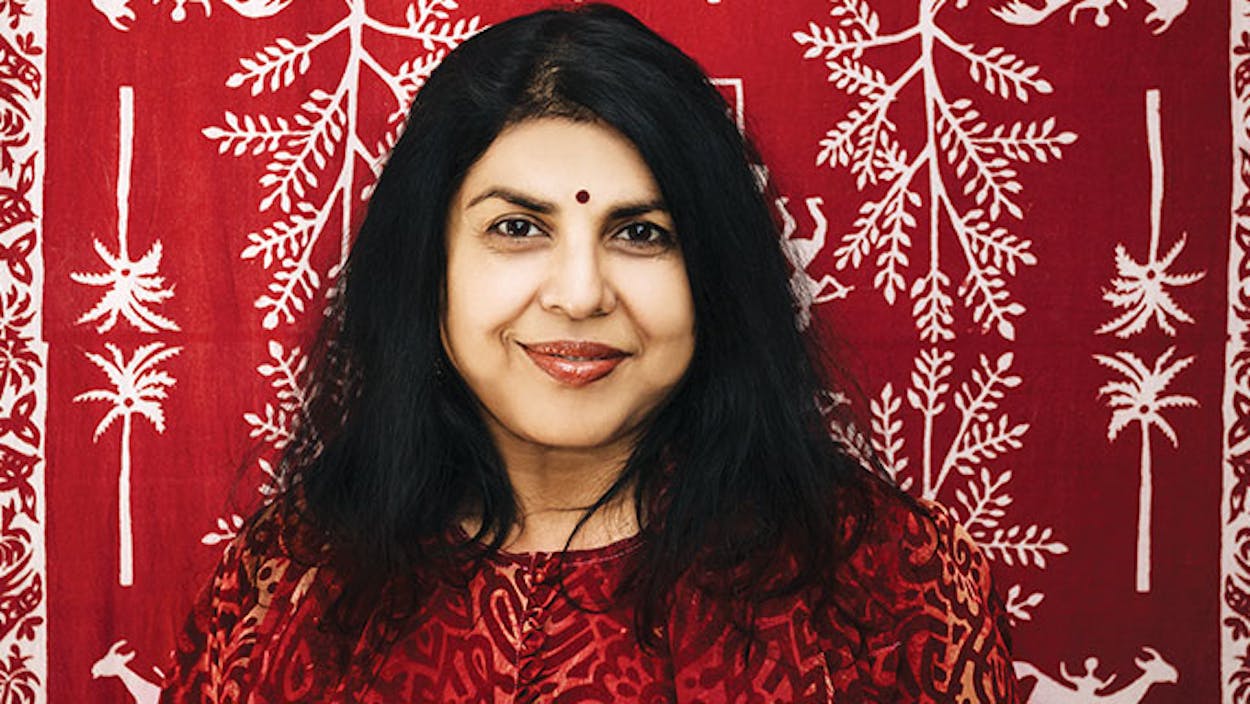As Chitra Divakaruni walks into Houston’s Blacksmith coffee shop, it’s easy to spot her among the other patrons. It’s not that the Calcutta-born author is Indian—which isn’t unusual in Houston—it’s that she’s wearing a deep-purple sari. Traditional dress of any sort is atypical these days in the Montrose neighborhood, where a uniform of tight jeans and lumberjack shirts is de rigueur for men, and women favor vintage garb and yoga gear. She stands out like a bouquet of violets in a metal shop.
Divakaruni is squeezing in a quick lunch before heading to the University of Houston, where she has taught creative writing since 1998. She orders a scratch biscuit with egg and cheese (hold the sausage) from the barista. “I hear you make your own almond milk,” she adds. “I want to try it.”
Montrose is the setting of Divakaruni’s latest work, the libretto for a chamber opera, River of Light, written in collaboration with composer Jack Perla. The piece, which is to be performed by Houston Grand Opera on March 29 and 30, follows Meera, a recent immigrant from northern India with a high-flying corporate job and a Montrose loft, as she and her artist husband celebrate Christmas, the Fourth of July, the birth of their first child, and ultimately Diwali—the Indian Festival of Lights—an event that forces Meera to confront her detachment from traditional Indian culture and her assimilation as an American. Meera would never be caught out and about in a sari. Nor would she be caught dead in a suburb like Sugar Land or Katy, where Houston’s South Asian community congregates and preserves its traditions.
And that’s the difference between Meera, who married a man of her choosing (played by an African American in the HGO production), and an earlier immigrant such as Divakaruni, who arrived in the United States as an adult in 1976, has an Indian husband, and lives in Sugar Land. Though, she admits, she has stooped to making gulab jamun out of Bisquick, as Meera’s cousin suggests she do.
“Sugar Land does the best Indian food in Houston—authentic food in simple places,” Divakaruni says, looking around to acknowledge her surroundings. “Not like the fancy Indian fusion restaurants you have closer to downtown.”
Divakaruni’s longing for home was one of the things that turned her into a writer and inspired many of her award-winning poems, short stories, and novels. But today she’s just as comfortable sipping almond milk in a swank urban spot as she would be sipping tea in the suburbs. She came to town sixteen years ago for a job, but she found instead a life, and the inspiration for an opera.“Look around Houston and what you see is a reflection of how the world itself is changing,” she says. “You have the traditional type of immigrant, the ones who come with nothing, suffer, make sacrifices, and turn themselves into a success. And you have Meera, who arrives as a success. But even then, there’s something missing. Something from home. I wanted to write that story.”
- More About:
- Art







